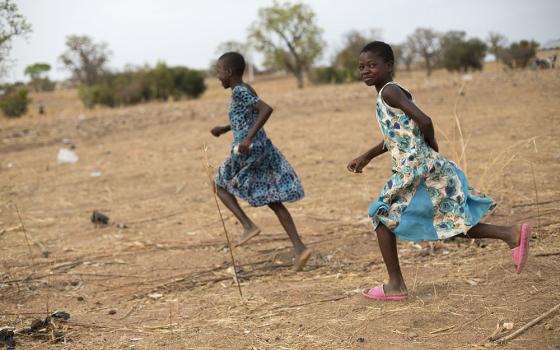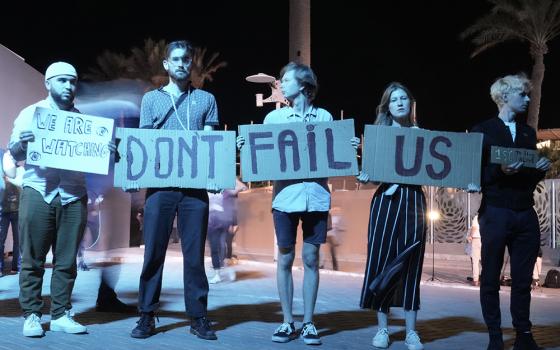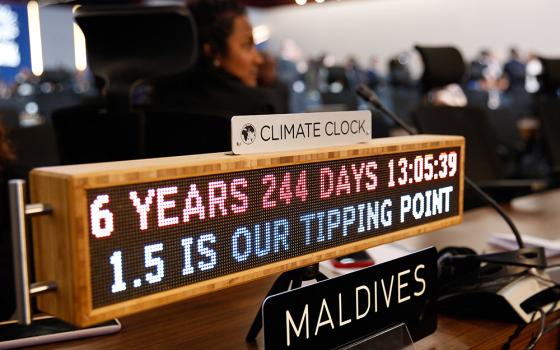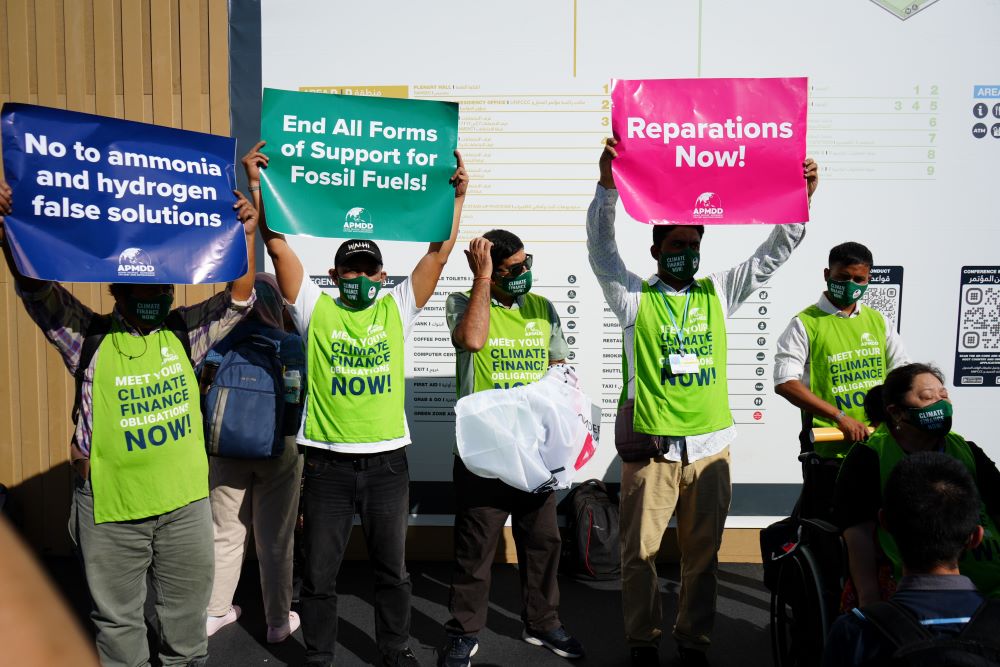
Climate activists from Asian Peoples' Movement on Debt and Development raise concerns in Sharm el-Sheikh, Egypt, Nov. 9, 2022, after various heads of state, especially from wealthy countries, failed to implement climate mitigation funds. APMDD is a regional alliance of peoples' movements, community organizations, coalitions, NGOs and networks. (EarthBeat photo/Doreen Ajiambo)
They sang, they danced and they clapped. As world leaders gathered at the United Nations climate conference to figure out how to deal with climate change, faith organizations found their voices through protests.
The Christian youths from across the world were out to dramatize the hurt the environment was going through, and with it, the entire human race.
Joe Bongay of the Catholic Youth Network for Environmental Sustainability in Africa told Catholic News Service the protests were meant to draw attention to the need to care for the earth, in line with Pope Francis' encyclical "Laudato Si', on Care for Our Common Home."
"When you sing about it, when you clap about it, it reminds people of their moral obligations toward caring for what we all share, which is the common earth that we all live in," he said.
He told CNS how a changing climate was affecting ordinary people across Africa, citing the drought in East Africa, where the U.N. has predicted more than 50 million people will suffer from acute hunger by the end of the year.
Advertisement
"We are struggling to survive in terms of food, in terms of hunger, and so many other problems brought about by climate change. Africa is at a point where it can't even feed itself," he told CNS.
Nigerian Catholic activist Lucky Abeng talked about the devastating floods in his country that killed more than 600 people in October alone and displaced more than a million more.
"Climate change is here with us," he said.
Rita Uwaka of Friends of the Earth Africa expressed discomfort with the presence of fossil fuel lobbyists at the COP27 event, as the climate conference is known.
"The so-many corporations taking over the climate space are hijacking and manipulating the negotiation process, and we feel that these criminals fueling climate crises need to be kicked out. It's high time that there is sanity in COP. And the only way we can get sanity and justice is to make sure that these polluters pay but also (are) kicked out of the climate negotiations," she told CNS.
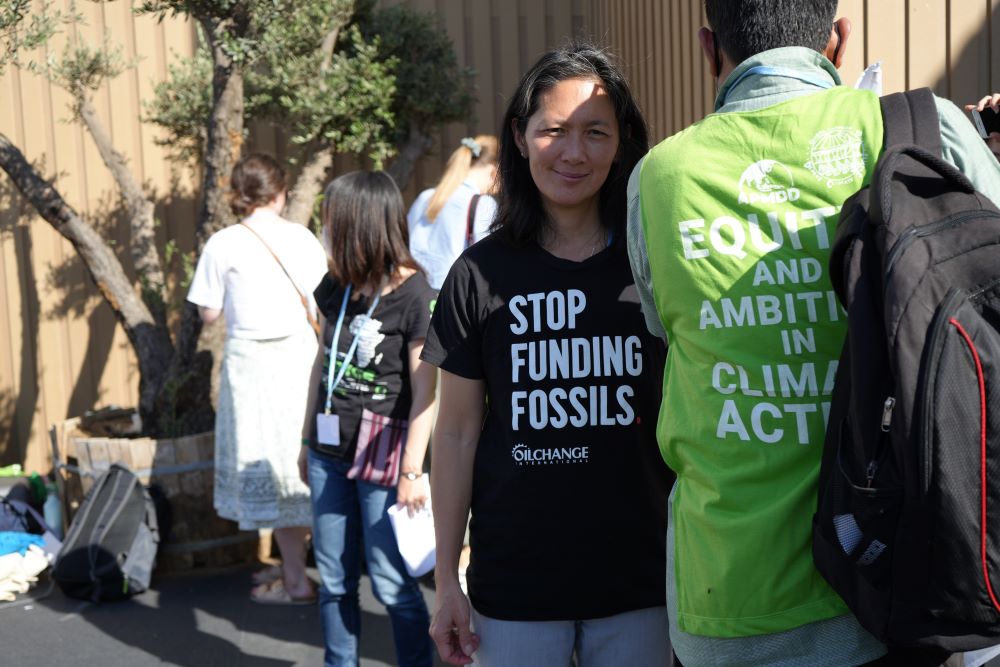
A protester wears a t-shirt with the message "Stop funding fossils" during a demonstration at the COP27 climate summit in Sharm el-Sheikh, Egypt, Nov. 9, 2022. Over 50 activists of all ages and backgrounds took over the so-called "Blue Zone" — the central area of the conference center in Sharm el-Sheikh — to chant, "Stop funding fossil fuels! Stop funding death!" (EarthBeat photo/Doreen Ajiambo)
She blasted leaders for seeking what she called "false solutions" to the climate emergency, citing carbon markets as an example.
"There are a lot of false solutions. Take carbon credits for instance. It means you have to keep polluting in the developed countries, and then you come to Africa to plant trees to absorb the carbon, but you are not stopping pollution at the source. That is a false solution, and we reject it," she told CNS.
She complained that agro-commodities companies "are in the negotiation space; they are fueling a lot of land grabs in Africa — taking over forests, cutting them down and replacing them with plantations. And this increase in deforestation as a result of agro-commodities expansion is fueling climate change. But here, they are putting it as a solution."
"We don't want false solutions," she said, explaining that local communities in Africa and other developing countries should be leading the search for solutions in which accessible and affordable renewable energy is encouraged.
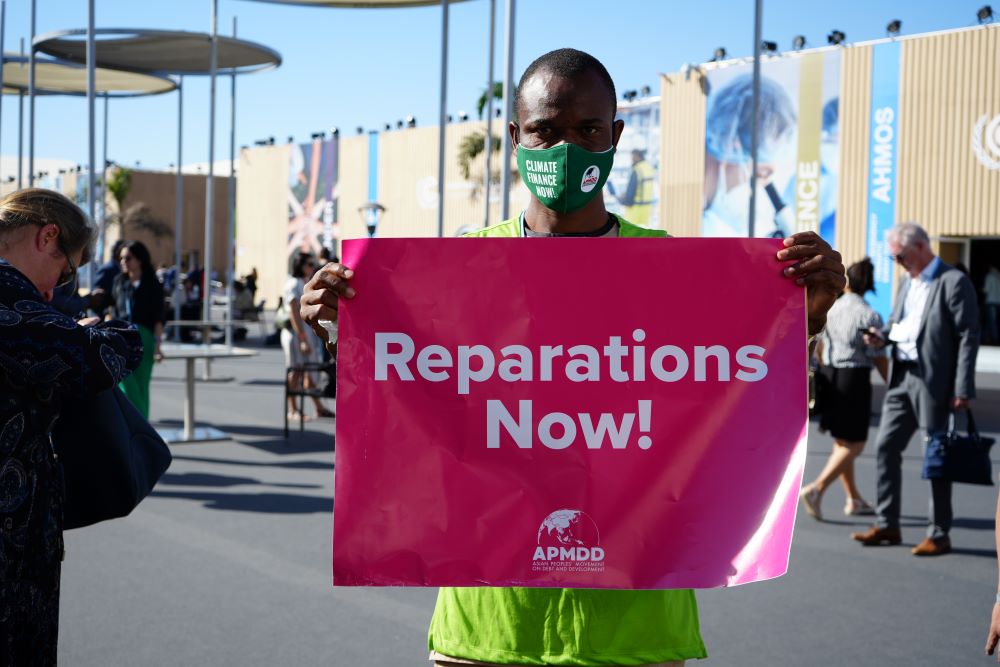
An activist carries a placard as he demonstrates at the central area of the conference center in Sharm el-Sheikh, Egypt, Nov. 9, 2022. (EarthBeat photo/Doreen Ajiambo)
"We want solutions like agro-ecology, where you put food production in the hands of the people. We want community forest management methods that put the management of our forests in the hands of communities."
Bongay added that he was opposed to the proposal that some kind of carbon insurance should be instituted. He said it would be an injustice if Third World countries, already reeling from the effects of a changing climate they did little to cause, were asked to pay climate insurance.
"We can't afford it," he said.
"It is not a solution. He who begins the fight must finish it ... We shouldn't use our ... taxpayers' money to adapt, because we didn't cause climate change. Developed nations that are getting the profits at the expense of humanity and the environment should be able to pay their climate debts and reparation to those who are most vulnerable.




